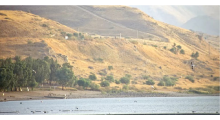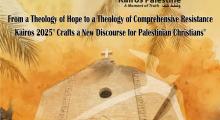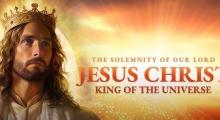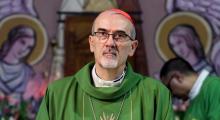Issued by the Catholic Center for Studies and Media - Jordan. Editor-in-chief Fr. Rif'at Bader - موقع أبونا abouna.org

The Kairos 2025 document, “A Moment of Truth: Faith in a Time of Genocide,” marks a decisive turning point in Palestinian Christian discourse. It goes beyond updating the 2009 Kairos Palestine document, “A Word of Faith, Hope, and Love from the Heart of Palestinian Suffering,” to redefine the conceptual and intellectual framework that shapes the community’s understanding of faith, justice, and resistance.
Unlike its predecessor, Kairos 2025 shifts from framing the Israeli occupation merely as a sin to diagnosing the daily reality of genocide, ethnic cleansing, apartheid, and settler colonialism experienced by Palestinians. Using precise terminology grounded in UN reports and international law, it unequivocally rejects any moral or religious justification for ongoing aggression. Boldly naming reality as it is, the document functions as both a theological and quasi-legal record of grave violations in Gaza and the West Bank, documenting massacres, mass killings, destruction of health and educational infrastructure, systematic starvation, arbitrary arrests, torture, enforced disappearances, and attacks on women and children—including environmental devastation of entire neighborhoods. All these acts are categorized as genocide.
The document also addresses the West and Western churches, accusing some institutions of adopting political narratives that justify violence or of practicing silence akin to complicity. It warns against distortions propagated by Christian Zionism, which often seeks to legitimize oppression and colonization, and calls on churches worldwide to reject, question, and boycott such theology. At the same time, it emphasizes the distinction between Jewish communities and the Zionist state as a colonial project. It condemns attempts to exploit accusations of antisemitism to silence Palestinian rights advocacy and denounces all forms of racism and exclusion, including Islamophobia.
A Clear Diagnosis of the Palestinian Internal Reality
Kairos 2025 provides an in-depth analysis of internal Palestinian challenges. These include a crisis of leadership, political division, loss of trust in institutions, corruption, fragility of the political system, escalation of intra-factional violence, and the accelerating emigration of Christians—a demographic threat to the Palestinian Christian community. This internal perspective links external violations with domestic turmoil, highlighting that the struggle is not only against occupation but also requires national awareness and responsible engagement from all parties, including the local church.
Theological Update and Comprehensive Resistance
The theology articulated in Kairos 2025 promotes comprehensive resistance—ethical, legal, and national—connecting Christian faith with human rights, justice, and national protection. It rejects any religious justification for violence or colonialism while affirming international accountability. The document moves beyond classical discourse emphasizing “God is love” and messages of hope and peace, presenting a theology that categorically condemns ongoing violence and genocide as a “sin against God, humanity, and creation.”
While Palestinian resistance and global solidarity movements are often criminalized, the document affirms the right of colonized peoples to resist. It advocates adherence to ethical and humanitarian principles, rejects framing the conflict in religious terms, and highlights the efficacy of peaceful resistance and global advocacy.
Roots and Our National Christian Identity
Kairos 2025 underscores the Christian presence in Palestinian lands as a national priority. It celebrates the steadfastness of Gaza’s inhabitants and honors those martyred defending life and dignity. The document affirms unity between Palestinian Christians and Muslims in resisting occupation and discrimination, while advocating for a liberating Christian ethos—one that rejects extremism, embraces the vulnerable, and connects faith with national and social resistance.
Ethical, Social, and Environmental Initiatives
The document also addresses social, political, and environmental justice. It emphasizes the empowerment of Palestinian women, the care of land and water resources, and the role of the diaspora in strengthening local resilience. This reflects a holistic vision linking national liberation with the broader pursuit of a dignified life, grounded in Christian values and national commitment.
Commitment to International Law and Human Rights
Firmly anchored in legal obligations, Kairos 2025 labels Israeli crimes in Gaza as genocide according to International Criminal Court reports. It rejects policies rooted in ethno-religious superiority and calls for accountability for perpetrators, framing any future peace on principles of justice and equality.
Key Innovations Compared to the 2009 Document
- Expanded internal diagnosis: political division, corruption, internal violence, and the emigration of Christians as existential threats.
- Explicit affirmation of the right of colonized peoples to resist, moving beyond limited acknowledgment of armed resistance.
- Linking theology with international law: precise use of terms such as genocide, rather than general moral analysis.
- Emphasis on social and environmental justice: women’s roles, land preservation, and diaspora engagement, reflecting a holistic vision.
- Confronting Western ecclesial policies: criticism of Christian Zionism and silence on crimes, advocating global moral conscience, and rejecting misuse of antisemitism claims to obscure Palestinian rights.
Future Challenges
Despite its boldness and legal-theological depth, Kairos 2025 highlights the need for a clear roadmap post-genocide. This includes the protection of Palestinian institutions, fostering national resilience, and promoting unity among all parties. The document stresses youth participation and the cultivation of a Christian-national generation capable of confronting complex societal challenges. It also provides practical examples of alliances with churches and international organizations to support the Palestinian cause and ethical resistance.
Conclusion
Kairos 2025 represents a pivotal stage in Palestinian Christian discourse. It combines legal and theological analysis, documentation of crimes, and critique of international and ecclesial policies with a clear call to stand for justice. The document serves as a central reference for confronting genocide and rebuilding Palestine on the principles of justice and liberation, while preserving national Christian identity and the spirit of ethical resistance.
About Kairos Palestine
Kairos Palestine is a Palestinian Christian ecumenical movement founded in 2009 with the historic Moment of Truth document. Rooted in faith, hope, and a commitment to justice, it gives a prophetic voice against oppression in Palestine.
The movement calls on Palestinian Christians and churches worldwide to stand against injustice and apartheid, and to work courageously for a just and lasting peace. On 14 November 2025, in response to ongoing genocide, ethnic cleansing, and forced displacement, Kairos Palestine launched its second major document: “A Moment of Truth: Faith in a Time of Genocide.”
This new document presents a renewed theological and ethical framework for confronting violence, defending human rights, and sustaining faith, hope, and national Christian identity in a time of unprecedented challenges.
 Archaeologists identify the site where Lord Jesus exorcised the legion of demons and the herd of pigs
Archaeologists identify the site where Lord Jesus exorcised the legion of demons and the herd of pigs  The Fifth International Congress of the Commissaries of the Holy Land kicks off, November 19
The Fifth International Congress of the Commissaries of the Holy Land kicks off, November 19 




